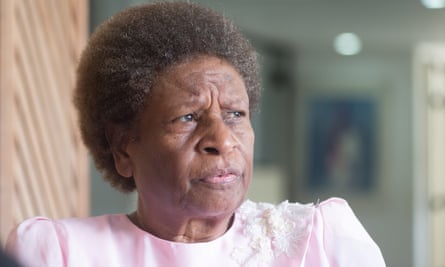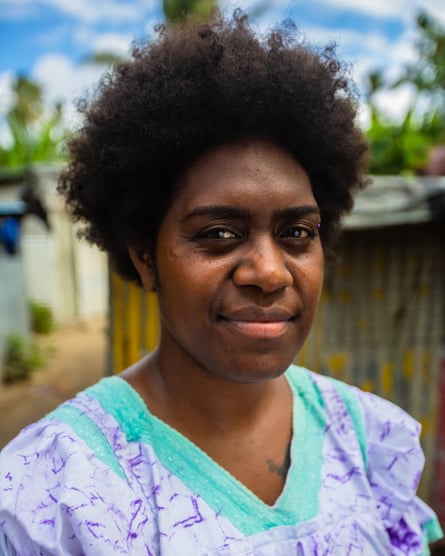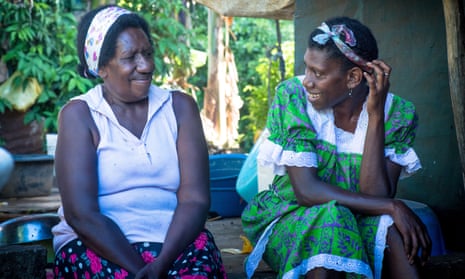Motoralivoa Hilda Lini stands at the front door of Vanuatu’s parliament, wearing an elegant pink dress and customary pig tusks on her wrists, signifying her chiefly status. When the Guardian apologises for being late, because we had been waiting on the street unaware it was possible to simply walk into Parliament House, she replies: “Hemia ples blong yumi evriwan” – this place is for everyone.
Except it isn’t. At least not at the moment.
Vanuatu – a South Pacific nation with a population of nearly 300,000 people, just a three-hour flight from Australia – is regarded as one of the more progressive nations in the Pacific. But there is one area where it is glaringly out of step: it is one of just three countries in the world with no women in its parliament. The last time a woman was elected into parliament in Vanuatu was in 2008.
But as the country prepares to go to the polls on Thursday to elect a new government, there has been a concerted push to make sure women are among the 52 MPs elected to the new parliament.
“We need women in there; there is no question about it,” says Lini, who became Vanuatu’s first female member of parliament when she was elected in 1987. “We fought for Vanuatu to become a democracy and if we want to make democracy a reality, then we need to include everyone in decision making.”
Hailing from the island of Pentecost, Lini is one of the few female chiefs in Vanuatu. Her brother, the late Father Walter Lini, was one of the founders of Vanuatu and the first prime minister of the country after it achieved independence from Britain and France in 1980.

She worked alongside her brother in the liberation movement and served in the country’s parliament from 1987 until 1998. Since then, Lini has continued to be a vocal advocate on a range of issues, including women’s rights and in 2018 was approached by the Vanuatu National Council of Women about setting up what is believed to be the Pacific’s first ever woman-led party, the Leleon Vanua party, with the aim of increasing the number of women in politics.
“Women have not been successful in the last two elections and there is no political will from the government to promote gender equality at the parliamentary level,” says Lini.
‘People want something different’
This year, there are more than 15 women standing for election, including 28-year-old Litiana Kalsrap, who is believed to be the youngest candidate.
In an open-air community hall in Blacksands, near Port Vila airport, the wife of the local pastor opens a community event with a prayer and a song before Kalsrap introduces herself at a meeting designed to raise her profile ahead of the vote.
Kalsrap, who hails from Pango, a popular seaside village known for its surfing beaches, is one of two candidates – both of them female – who will be endorsed this year by the Shepherds Alliance party. Despite her traditional island dress, Kalsrap is a truly millennial candidate, with tattoos, an eyebrow ring and a sense of confidence that it is time Vanuatu politics made room for people like her.

“I’ve observed campaigns in the past and candidates will always say what they can do. That’s not my strategy. I want to listen to what the people want us to do. We have been in the same political system for a long time and people want something different,” says Kalsrap.
Kalsrap’s experience as a youth leader and climate activist has seen her travel extensively across the globe. A recipient of the Queen Young Leaders award and the founder of her own youth organisation, Kalsrap hopes that the reputation she has garnered through her community work will secure the votes she needs to get into parliament, a challenge given her party has no financial support to run a fully fledged campaign.
“I’ve heard indirectly that ‘she’s too young’, ‘she doesn’t understand politics’, ‘she should wait until the next election in 2024’. I expected criticism, so it’s not a big deal,” says Kalsrap. “But from the most of the women and the youth, I have been given support. I’ve known ever since I started doing volunteer work in 2010 that 2020 was going to be my year to contest.”
For other women, the road to parliament has been even tougher. For Marie Leitousei Kalkoa, an independent candidate who is contesting a seat in Port Vila, every political party that her campaign team has approached for endorsement has rejected her.
She knows the opposition that female politicians face. In 2014, Kalkoa was elected as a councillor in the country’s capital of Port Vila, one of five female councillors elected through a gender quota system. She says that the women councillors bonded over the stigma they faced.
“We had different political alliances but we connected as women first,” she says. “We understood we were there to change the system and stood in solidarity with each other. The men really thought the reserved seats were a shortcut and did not understand that we were trying to change mindsets about women in decision-making.”
‘The men have a problem’
But this year, Kalkoa predicts things will be different – that more men will be accepting of women in leadership and that the voter turnout for women will be record-breaking.
Back at Parliament House, Lini believes things will change when men start looking at what women have contributed to Vanuatu society, rather than holding on to the notion of kastom, the idea of traditional culture that is deeply entrenched in Ni-Vanuatu society and sees chiefs play a big role in community governance.
“The men have a problem with their mentality and attitudes towards women. Women have contributed immensely to the development of Vanuatu,” Lini says. “Men need to be looking at that instead of looking at kastom and justifying the exclusion of women.”

On the outskirts of Port Vila, 21-year-old hospitality student and kitchen hand Emily Kekei says that how people view kastom will be the determining factor in their acceptance of women in politics.
“If someone holds on to kastom tightly, they will think that women shouldn’t be in parliament,” says Kekei. “In kastom, respect is important and that means women are to serve the men and not say anything.”
Kekei supports the participation of women in politics. So does her aunt, Lemen Toara, a 32-year-old housegel, or domestic worker. “Women are educated now and we know our rights,” Toara says. “If women were in parliament, I think they will do more for families and the community. Men just think about themselves.”
Kekei’s mother, Serah, 55 , is a supporter of the Vanua’aku Pati, one of the oldest parties in Vanuatu, and is a member of the party’s subcommittee in Fresh Wota. This year the Vanua’aku Pati is endorsing a female candidate.
“Inside a home, you have a woman and man to run the house, and when you are in an institution, it should be the same,” Serah says. “My party’s subcommittee is made up of women and men, and the church that I attend has both male and female pastors.
“But the point is, we need to work together to build a community, to build a nation,” she says. “It’s only one side if it’s just men ... We need women who work at the community level and then go to the top.”

Comments (…)
Sign in or create your Guardian account to join the discussion